Research
Function Module Wise
1. Healthcare Service for NCDs
The Portable Health Clinic (PHC) project endeavors to take healthcare facilities, along with doctors’ consultancy, to people's doorsteps. In developing countries like Bangladesh, rural areas hardly have any healthcare professionals, hospitals, or diagnostic centers. The PHC system has a handy briefcase which consists of several basic health checkup equipment. A trained-up Grameen Healthcare Entrepreneur (GHE) can carry it to the homes of her clients and conduct the necessary health checkups. The checkup results are instantly conveyed to the remote doctor over the internet to be monitored. Depending on the health condition of the client, s/he is provided to consult with the remote doctor through video conference. Using the prescription module of the system, the doctor writes an online prescription from his computer, and it is delivered to the client, printed immediately by the GHL using the printer in the briefcase. Thus, the necessity of having physical healthcare peripheries can be mitigated. On the other hand, patients can save their valuable time, effort, and money required in travelling to distant hospitals. PHC promotes preventive healthcare by encouraging adults to take health checkups regularly so that possible diseases can be diagnosed at the very primary stage. Thus, diseases can be prevented as well as their severity can be mitigated, leading to a reduction in healthcare expenses for patients. Thereby, the number of patients, along with excessive workload on existing healthcare human resources, can be minimized.
Another unique characteristic of the PHC system is that it promotes preventive healthcare. Nowadays, the prevalence of non-communicable diseases (NCDs) like Diabetes Mellitus and Hypertension has increased to a concerning extent. Bangladesh is also not an exception, and from our studies, we have learned that not only the urban people, but also the people in rural and suburban areas are equally affected by these diseases. These diseases and the subsequent complications can be effectively prevented by taking precautions beforehand. Prevention is more important in countries like Bangladesh because of the limited ability of people to spend on health bills and the absence of provision from the government. Preventing such diseases from occurring or diagnosing them at an early stage can help people save a lot on medical bills. For this, regular screening of health status is important, which can be facilitated by PHC. 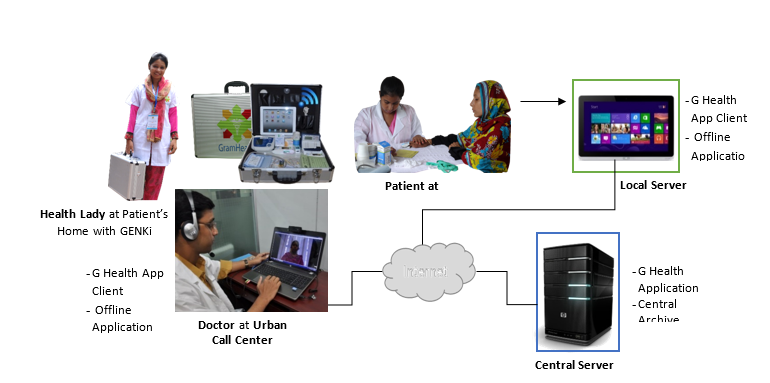
Checkup Package: The PHC box is equipped with the following checkup devices-
- Body Temperature
- Blood Pressure
- Pulse Rate
- Arrhythmia
- Height, Weight, and BMI
- Waist, Hip, and W/H Ratio
- Oxygenation of Blood
- Blood Glucose (random)
- Urinary Sugar
- Urinary Protein
- Blood Cholesterol
- Uric Acid in Blood
- Hemoglobin
- Blood Grouping
- Online doctor consultation
One of the integral parts of GramHealth is the PHC Application and Server System. The PHC system creates and maintains a profile for each of the patients served. All the checkups taken at every point in time, along with prescription (if any) and case history, are stored under the system, so that the doctor can look at the patient’s previous records as a reference while advising. It incorporates both web and Android-based systems, so it is usable from any portable device. The system maintains smooth coordination among GramHealth Lady (GHL), the doctor, and the patient.
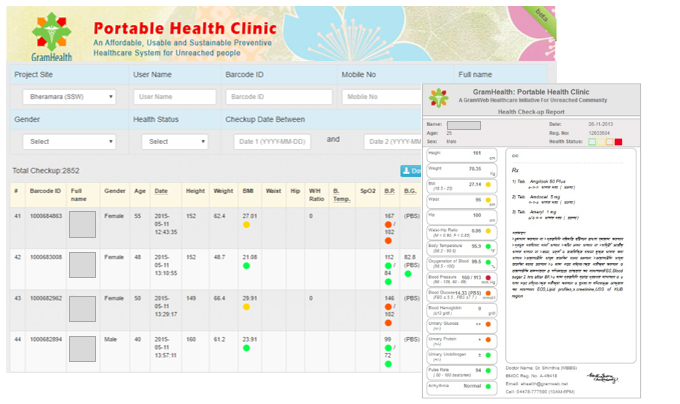
2. Tele-Pathology
We have a crisis of pathologists in rural areas. PHC became a popular & trustworthy tool for pathological report generation. A trained PHC healthcare worker (Diploma in Laboratory Technologist) collects samples of blood, urine, stool, cough, and/or skin, and prepares glass slides for microscopic analysis. Then s/he produces 6-10 different microscopic images from different viewpoints and uploads them to the PHC server. A PHC Pathologist in the urban area has access to the images and produces a report. The report is preserved in the system and shared with the patients. So far, this system has produced 5,139 reports in 4 different healthcare centers in Barishal, Bogura, Manikgonj, and Thakurgaon districts since 2020. The majority of the tests are of blood and urine. This project was jointly funded by Grameen Kalyan and Grameen Healthcare Services Ltd.
The following tests are done through PHC Tele-Pathology services
- Haematological Report
- Biochemistry Report
- Microbiology Report
- Urine Report
- Stool Analysis Report
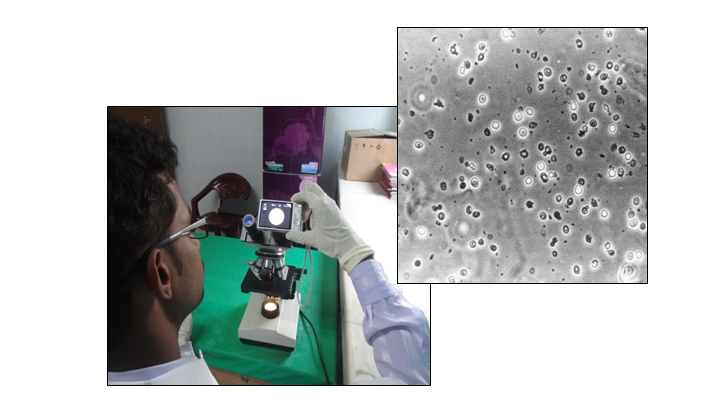
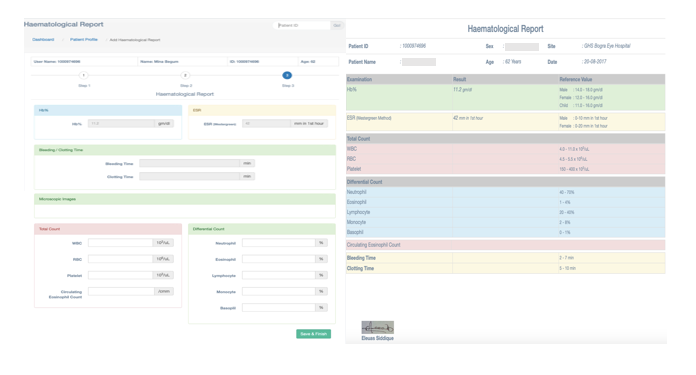
3. Tele-EyeCare
This is a service for patients of any age. We target rural areas where ophthalmologists are not available. A healthcare worker takes retinal images of the critical patients using a digital camera in a prescribed format compatible with the software and uploads the images to the PHC server together with a physical observation report. A registered ophthalmologist from a distance accesses the server to check the images, talks to the patient over a video call, and finally writes a prescription for the patient. The report is also sent back to the patient for further consultation with other doctors if needed in the future. We have served about 3,919 services in the Singra Vision Center within the Natore district since 2020. The project has been funded by Grameen Healthcare Services Ltd.
The following eye tests/examinations are done through PHC Tele-Eyecare services.
- Primary Investigation
- Vision Test
- Final Examination
- Refraction
- Glass Prescription
- Eye Prescription
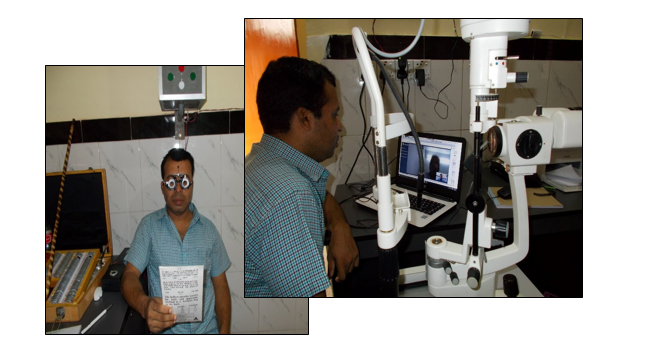
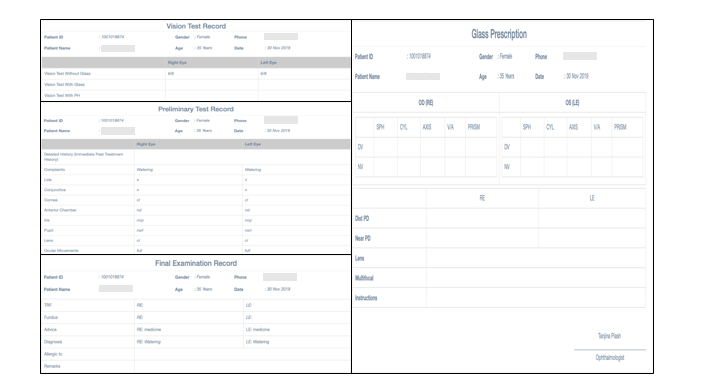
4. Maternal and Child Healthcare (MCH)
The aim of this project is to help the rural pregnant women and newborn babies where access to an Obs and Gynae doctor is difficult. We are following the WHO guidelines to monitor a pregnant woman from the beginning of her pregnancy up to 6 weeks after the child's birth. A total of 8 checkups are provided during this period with the help of PHC rural health workers, followed by tele-consultancy by a gynecologist in the city. Besides, we are also monitoring all productive aged women between 15-49 years and providing basic health checkups by using PHC as preventive healthcare in the service area. The experiment started with a baseline survey in August 2018. We have started a pilot study from June 2019 for 439 subjects in 1 union of the Shariatpur district. It will continue up to May 2021 at this phase. The project is funded by JSPS Bilateral Collaborations (Open Partnership) and Pfizer Health Research Foundation.
5. Virtual Blood Bank (VBB)
Blood is a very important biological fluid of the human body, and it is often deemed to be a lifesaving tool. So it is necessary to preserve blood in a scientific way so that it can be utilized further for the next person who is in need of blood. But on the other hand, it is not easy to store blood, and it requires good infrastructure. In Bangladesh, it is not always possible to store blood even in rural areas. Some organizations are storing blood only in big cities like Dhaka & Chattogram. Then what about the rural areas, as blood is equally important for them too? Keeping these limitations & demand in mind, Global Communication Center (GCC) thought to preserve blood donor information rather than storing blood since the human body itself is the best place storing place for blood. Based on this concept, GCC developed an online portal and named it Virtual Blood Bank (VBB), where interested blood donors will be stored only for the blood seeker. It was a joint initiative of the Earth Identity Project (EIP) and GCC. VBB has been developed as a point of information storage for the blood donors and seekers in Bangladesh.
VBB started in the year of 2014, and by June 2020, we had information on more than 36,000 blood donors in our database. To be a blood donor or receiver, a person must log in to the VBB website (www.vbb.ghealth.net ) and then need to register as a blood donor or receiver. After completing the registration process and putting in some basic information, he/she can be able to find a suitable blood donor/receiver nearby his/her location.
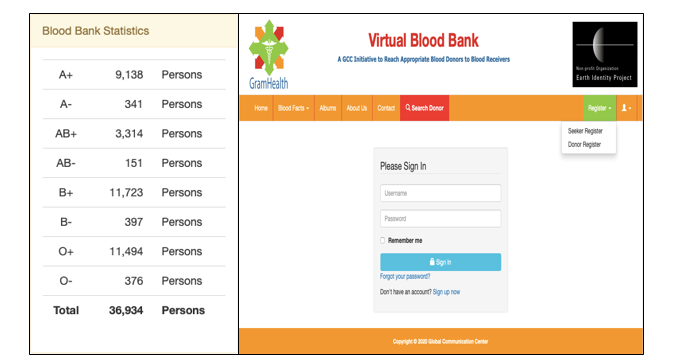
6. Children's Health Care (CHC)
Seeing the growing demand for PHC in different healthcare sectors has made us very optimistic, and it indicates PHC could be used in versatile ways and in different magnitudes. We transformed PHC in different shapes, thus the PHC system could be compatible with societal healthcare needs. We started to serve children (aged between 3-14 years) under the PHC Child Module in Ekhlaspur, Chandpur, and in the year January 2020, 50 school-going children received healthcare services. It is still under piloting phase, but soon we will have a plan to go into commercial replication with this module.
7. COVID-19 Care
It is a new expansion of the PHC system called “PHC for COVID-19”. This system has been developed for home-quarantined COVID-19-positive patient follow-up and treatment from a distance. It contains various self-checking medical sensors for patient health monitoring, including a COVID-19 system application in a tablet PC for communication between the patient and the doctor for tele-consultancy, maintaining a safe social distance. This system also uses a triage tool for identifying suspected COVID-19 cases at an early stage who will need a PCR test and/or be hospitalized. This will reduce the wastage of our valued medical resources in this pandemic.
Service Model Wise
In order to implement the model throughout the communities, we have been working to develop a sustainable business model.
1. Rural Model
People with low income. Access to hospitals is not easy. Almost 70% of them do not have a health checkup in their lifetime. NCDs are becoming common. Recently, people became aware of diabetes. It is expensive for them to control diabetes. PHC is providing diabetes monitoring at one-third of the cost of other service providers. PHC is trying to provide a basic health checkup service to give them an early wake-up call as a preventive measure. From our experience, we assume that a healthcare worker can serve 200 patients per month as a home delivery service. In the best setup, she can save 150 USD per month after the cost, which is equivalent to a standard salary in rural Bangladesh. However, promotional activity is required before she starts a business. She needs about 2,000 USD to start a PHC community business, which can be ideally funded by the Grameen Nobin Uddyokta (new entrepreneurship development) program.
The young people who have already completed a course to work as health workers (paramedics or nurses) can easily become an entrepreneur by taking the services of PHC to his/her community. They can take the PHC box along with the necessary devices, consumables, and hands-on training on operating the devices and the PHC system. Besides, we ensure call center support with proficient doctors from Dhaka and provide necessary access to our system, which enables them to run the services smoothly. We have estimated that a Healthcare Entrepreneur can run his/her business sustainably by serving at least 100 families in a community.
The Healthcare Entrepreneur in a rural or suburban area can deliver the services in two approaches. The first one is to go from home to home and visit patients on pre-scheduled times or on instant calls. Another approach is to set a service point, preferably in the local drug stores, sit there at specified times, and serve patients coming there. The Gram Health Entrepreneur (GHE) can make a balanced mix of two approaches depending on the needs of the community.
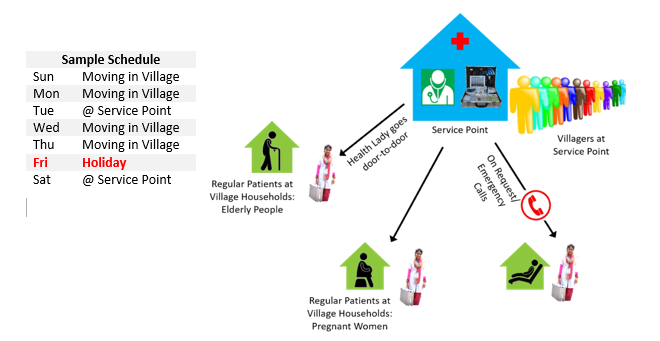
2. Urban Model
Although the primary target of PHC was the low-income rural communities, we have found a good client segment in the urban ageing community as well. The urban ageing community has the same characteristics as developed countries. The rich urban patients are knowledgeable, and most of them have their own blood pressure, diabetes test equipment, etc. However, sometimes it is not easy for them to take the checkup by themselves accurately and regularly as required for NCD patients. Besides, when they need to consult with a doctor, they need to visit a hospital through traffic-congested areas and stay in a long queue, which is very hectic for an elderly person. Now a PHC urban health worker visits registered patients at home at per preset schedule, conducts a health checkup professionally, and if needed, connects to our call center doctor for a consultation from the patient`s home. This low-cost service saves time, labor, and money for the ageing clients. So far, we have approached 31 urban apartments with 2,602 patients. We provide a free health checkup first and then register them as regular customers. The project was funded by Toyota Motor Corporation.
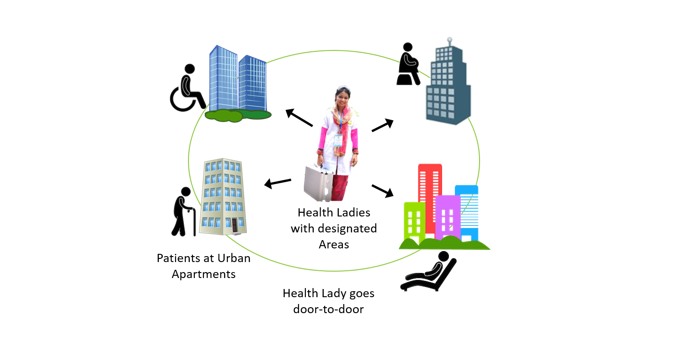
3. Community Health Camp Service
We also send health teams to villages from time to time and hold Health Checkup Campaigns, usually of 5-7 days. We offer the basic health checkup service to people aged 25 years or above and provide online consultancy by expert doctors for patients at health risk. We usually arrange the camps in the Union Parishad office or in the schools, so that people can easily gather and access the service.
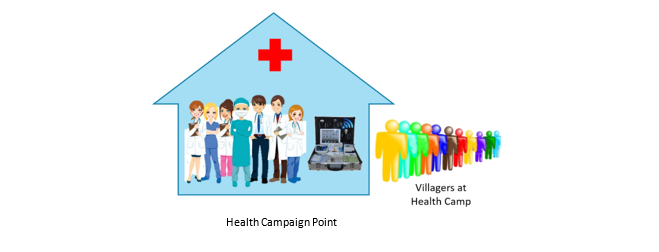
4. Corporate Service
This community includes female employees, mostly working in the garment industry, and male workers working in the construction industry. Occupational health services are rare at Small & Medium Enterprises (SMEs). We carried out health checkups. The project was funded by FIRST (2013 to 2015). Developing a business model for this sector is not easy. The employers can understand the necessity of such a service to enhance the productivity of their employees, but are not interested in spending money on the preventive healthcare service. Fortunately, we found a third party to pay from the buyer community for maintaining compliance as a requirement in the factories.
For the corporate companies and factories that want to provide a basic annual health checkup to their employees/workers, we have the facility to send health teams to their workplace and conduct a health checkup program. The corporate groups can also take the health checkup service as their CSR activity in the communities where they are working.
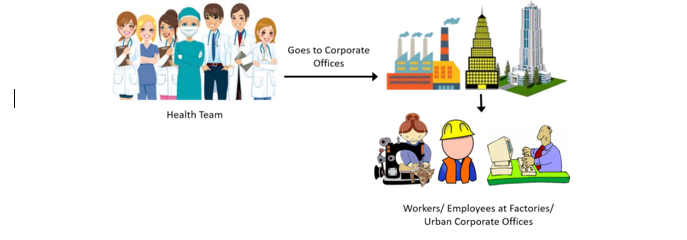
5. Pharmacy-Based Service Model
We have millions of pharmacies/drug stores across the country, and people have easy access to these if they need any medicine. And more importantly, people can get medicine without showing any prescription to the drug seller, and even drug sellers do not even ask for the prescriptions.
In a study, it has been observed that irrational drug usage, insufficient access to essential drugs, and wrong prescribing are major hitches affecting the overall health care scheme of Bangladesh. The National Drug Policy (NDP)-2016 has been constructed to ensure better healthcare by ensuring affordability, availability, and rational use of medicine. However, lack of knowledge and awareness among the dispensers and the general public have suppressed the effective implementation of the NDP-2016. It has been found that 75% of dispensers of the country know that selling, dispensing and distribution of drugs should be conducted under the supervision of a registered pharmacist but only 5% of A grade pharmacist, 4% of B grade pharmacists and 15% of C grade pharmacists were found in the medicines shops to dispense drugs.
To STOP this malpractice, GCC thought to develop a PHC service delivery model in pharmacy. Some pharmacy owners have completed a short course on healthcare, but they are not adopting healthcare service delivery as a profession; rather, they are selling drugs from their pharmacies and pretending to be doctors in their locality. On the other hand, people are also buying medicines from him. GCC piloted Pharmacy Based PHC in 2 districts of the country, i.e, Kalihati of Tangail and Bhederganj of Shariatpur. In this model, the pharmacy owner will provide healthcare services to the community using the PHC system. He/s will deliver service from his pharmacy, and this would be considered as a STOP SERVICE POINT for the customer. People can avail the opportunity to talk to the doctors, as in rural areas, we still do not have doctors available 7 days a week. After finishing some basic health checkups and using the online video conferencing tool of PHC, rural people can get appropriate medical treatment from an MBBS doctor.
After piloting this model, it has been perceived that this model is a win-win situation for both the pharmacy owner and rural people. Now people are receiving proper treatment, and on the other hand, the income of the pharmacy owner has also increased further as he can provide healthcare services sitting over his drug store, and people are buying medicines from his pharmacy prescribed by online doctors.
6. PHC for Garment Workers
Our Garment industry is also realizing the growing importance of starting healthcare services for their workforce to comply with buyers' demand. And as we all know, there is a huge shortage of doctors till now in Bangladesh; so it is almost impossible to ensure the physical presence of a doctor in every garment factory 24/7. Thus, PHC could be another realistic source for our garment industry. Hence, PHC has been supporting in healthcare sector for Epyllion Group and PRIMARK, and as of now, 12,523 garment workers have received healthcare services through PHC.





